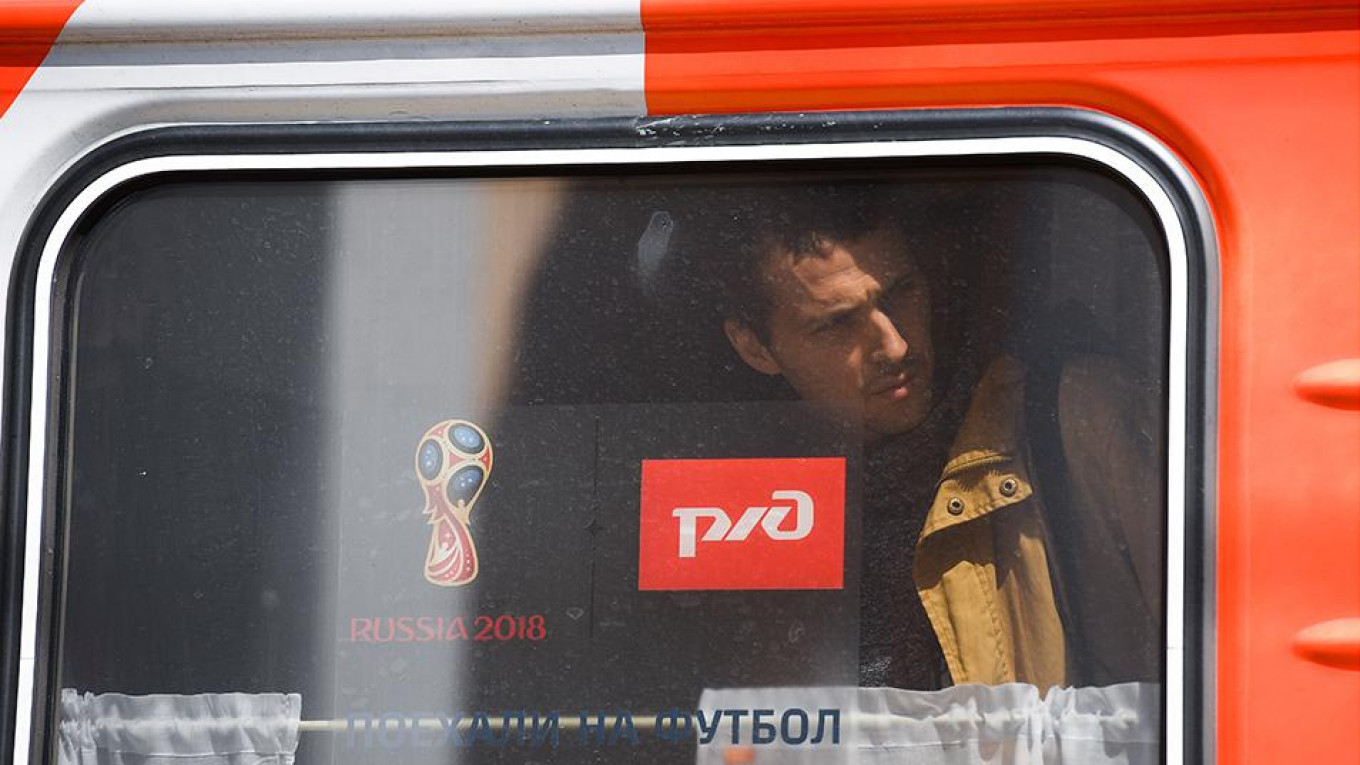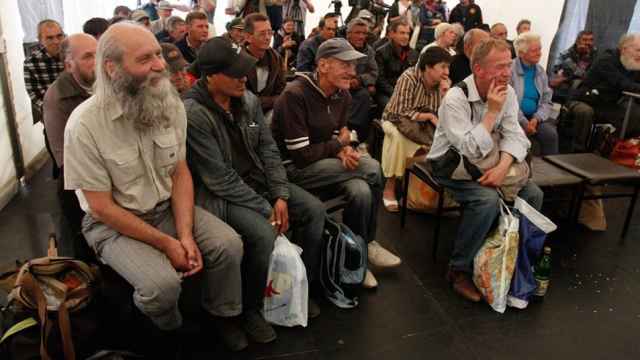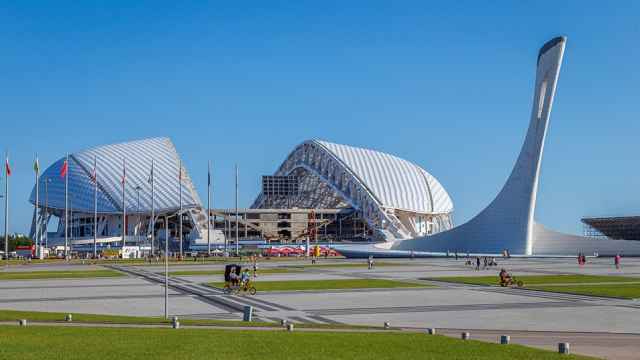Lena, 27, was the conductor of carriage number 3 on the train bound from Moscow to Orsk, 1,800 kilometers to the southeast. She wore a bemused look as dozens of foreign football fans filed into her car. On this day, her carriage was full of Peruvians, now famous for being among the more boisterous fans of the 32 nations in the World Cup. Clad in red and white, they were en route to their country’s opening game against Denmark in Saransk.
“Seat, seat! No wifi!” a Peruvian man was trying to explain to the bewildered conductor, pointing at his phone as the train left the capital.
Thousands of foreign football fans are making similar long-distance journeys across Russia’s vast expanses this month to watch their national teams compete in the World Cup. But foreign spectators hoping for a taste of Soviet-train chic might be left disappointed. Russia’s tracks no longer haul the rickety old vagoni of years gone by. They have been replaced with newer models, fitted with power outlets, USB chargers and, sometimes, even air conditioning.
“I don’t understand what he wants,” Lena said in perplexed Russian. “New sheets? A pillow?”
What’s more, the conductors are no longer the grumpy old babushkas of travelers’ lore. Most are young and cheery. Despite their best efforts, though, not all posses the language skills to communicate with the dozens of nationalities here for the football tournament.
It turned out that Juan Carlos, a 40-year-old electromechanic, did not know his seat number and couldn’t open his ticket on his phone due to the spotty internet connection.
When he eventually found his place, he told me he was here with his brother, nephew and a friend, and that they planned to follow the Peru team over 21 days to Saransk, Yekaterinburg and Sochi. “Peru hasn’t played in the World Cup in 36 years,” Juan Carlos explained. “This is a once-in-a-lifetime chance!”
Luis, his 22-year-old nephew, admitted that communicating with Russians, who were indeed very hospitable, had been difficult. “There was a guy at the Kazansky train station in Moscow we didn’t understand. He just kept buying us beers. ‘More beer! More beer!’ he kept saying. ‘No, no more beer!’ we told him!”
After a few hours on the train, the Peruvians plucked up the courage to chat with two girls across the aisle. Masha, 24, and Yulia, 25, both gym receptionists on their way to Samara for a vacation, crooned Spanish songs to break the ice. The grand finale was Ricky Martin’s “Livin’ La Vida Loca.”
Yulia said it was her first time meeting foreigners. “Nobody understands what the other is saying, but it’s so funny,” she said in a fit of laughter. “I like that they’re so open and willing to communicate with us,” she added. “Most Russians are quiet on trains, they aren’t really that happy or communicative.”
Back in my compartment, Elya, a chatty 61-year-old retired teacher who now works as a real estate agent in Moscow, said the World Cup atmosphere had suspended her skepticism of foreigners.
“The center of Moscow is so beautiful now!” she said en route to see her relatives and tend to her brother’s grave. “So many colorful costumes!”
Elya said she wasn’t that interested in football until she turned on the television in her kitchen while Russia was trouncing Saudi Arabia 5-0 in the tournament’s opening match. “Now I wish I could go see a game with Cristiano Ronaldo. He’s playing. Right?”
It wouldn’t have been an authentic Russian train experience without a vodka-fueled anecdote. Stopping in Ryazan, about two hours into the journey, the Peruvians piled out of the stuffy train to get some fresh air.

A Peruvian from another carriage, Miguel, 32, was immediately approached by a determined-looking Russian passenger, dressed in short athletic shorts and a black tank top.
“Peru champion?” he boomed, clapping Miguel on the back. “Drink vodka?” “Poquito,” Miguel shrugged. “We’ll find you [on the train],” the man said in Russian, relinquishing his grip on Miguel’s shoulder.
Then he noticed Paolo. “This is a good guy,” he announced to the passengers waiting around the train door. “He already drank two shots with us.”
“He’s almost a real Russian now,” one of the train conductors chimed in.
Daniel Kozin is an editor at The Moscow Times. The views and opinions expressed in opinion pieces do not necessarily reflect the position of The Moscow Times.
A Message from The Moscow Times:
Dear readers,
We are facing unprecedented challenges. Russia's Prosecutor General's Office has designated The Moscow Times as an "undesirable" organization, criminalizing our work and putting our staff at risk of prosecution. This follows our earlier unjust labeling as a "foreign agent."
These actions are direct attempts to silence independent journalism in Russia. The authorities claim our work "discredits the decisions of the Russian leadership." We see things differently: we strive to provide accurate, unbiased reporting on Russia.
We, the journalists of The Moscow Times, refuse to be silenced. But to continue our work, we need your help.
Your support, no matter how small, makes a world of difference. If you can, please support us monthly starting from just $2. It's quick to set up, and every contribution makes a significant impact.
By supporting The Moscow Times, you're defending open, independent journalism in the face of repression. Thank you for standing with us.
Remind me later.








